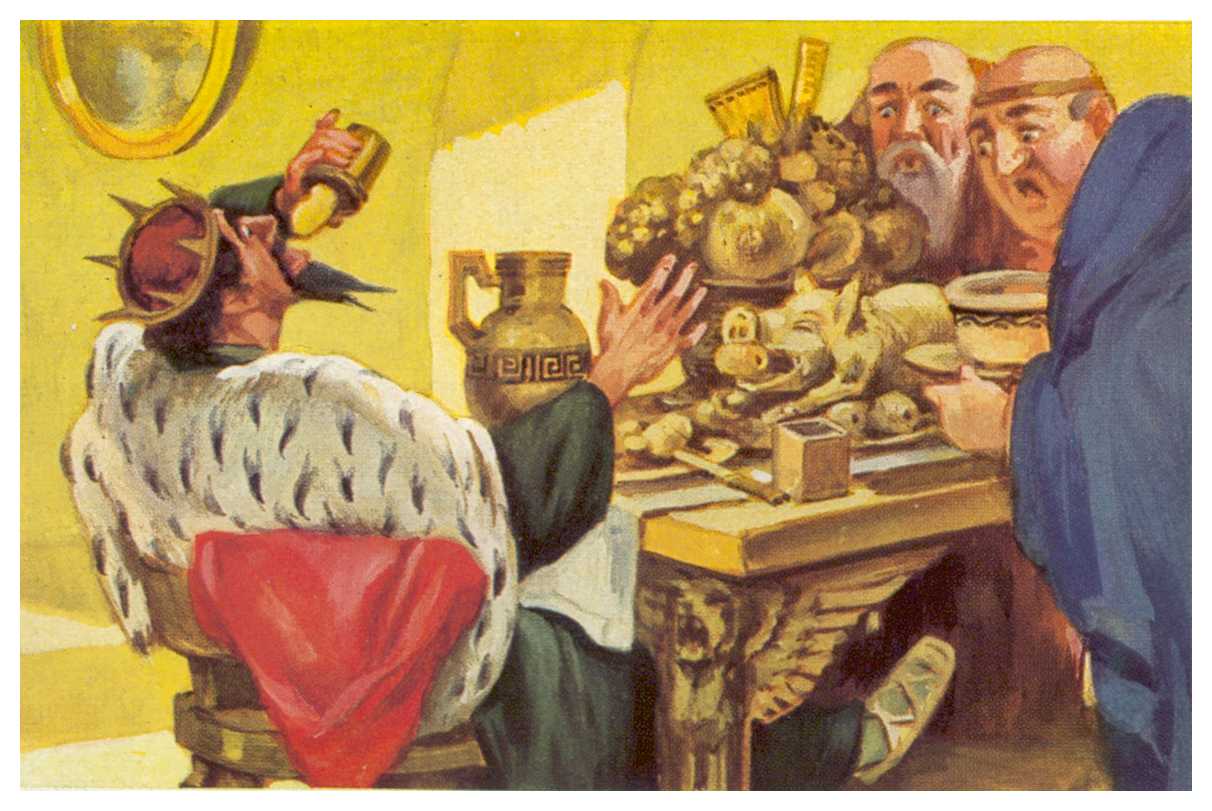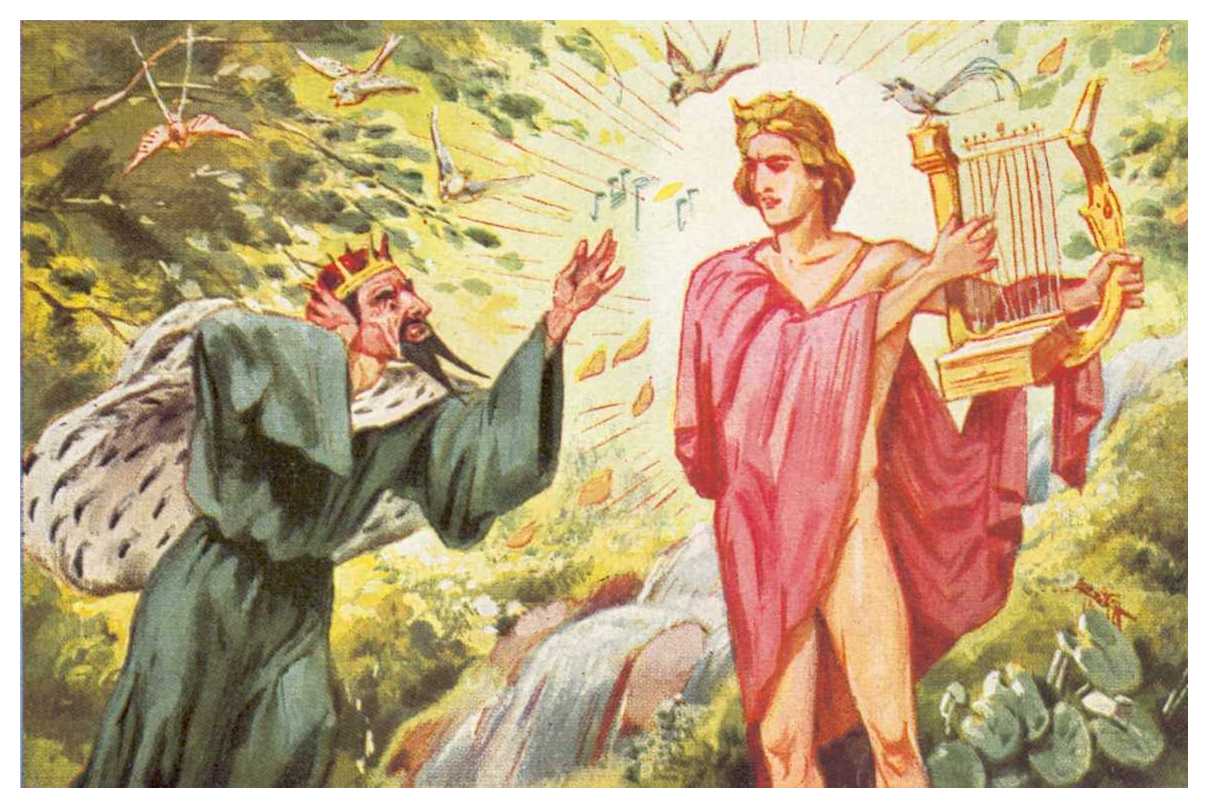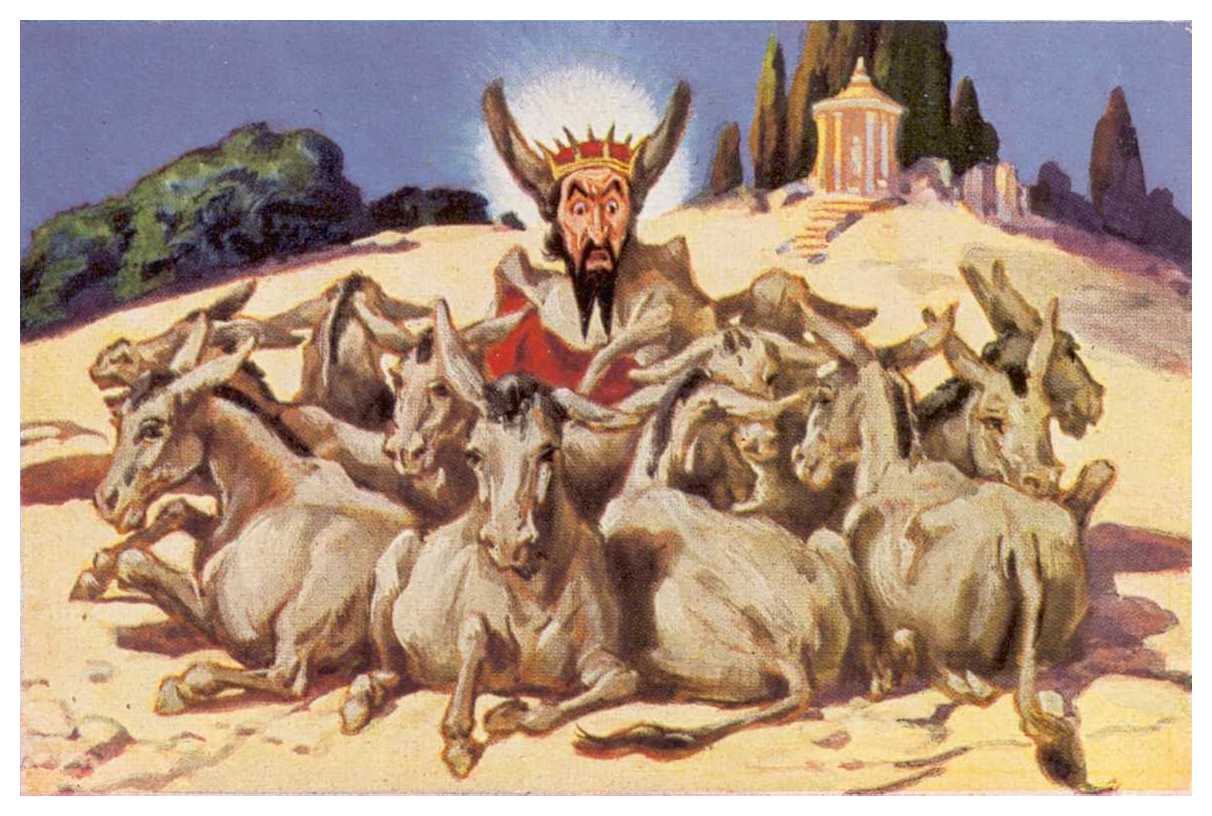
Let us look back to the ancient Greeks and their land of myth and legend. Let us imagine a picture. Dawn is breaking over the Hellenic coast. Aurora, the dawn, is gliding into the ardent embrace of the sun god. Helios is riding in the horse-drawn fiery chariot. - It is Arcadia
in all its glory: flowering meadows, shepherds' flutes, naiads dancing and playing, marble temples with Dorian pillars in cool dark groves, leaping fauns, raging maenads, fighting centaurs. The gods are conversing with kings, sending their messengers to humans. It is the world of Homer: a world now lost and forgotten. Let us revive one of those many legends - something entertaining about gods and humans.
Midas, then king, was as enormously rich as he was stupid - for there were also stupid kings. He had to atone for the fact that he didn't know how stupid he was. His foolishness led him to measure himself with the gods. Bacchus, the god of grapes, gave up trying to talk sense to him and, just to get rid of him, fulfilled his every wish.
 And King Midas had new requests every day. "Dearest god, let everything that I touch turn to gold", said the king one day without thinking. The god was not surprised by the none too modest demand. He gave the human his hand, maintained a benign expression on his face and promised blandly: "So be it - your wish is granted!" King Midas went off delighted. The stone on the road which he touched with his hand turned to gold. Ears of corn, apples, flowers, dishes, table and walls - they all became pure gold. But oh dear! food also turned into hard gold on which he broke his teeth. A cool drink got stuck in his throat in the form of a lump of gold. And so it went on for quite a while. Until at last the immensely rich king, now in a miserable state, starving to death, lay prostrate in Bacchus's temple imploring him to help: "Help me, my god, I am dying!" Bacchus the god was amused by the well-deserved punishment and graciously granted him relief.
Now, you might imagine that after such an incident in which a human like King Midas had had the temerity to make a nuisance of himself to a god, the said king would have learnt his lesson and, even if untalented with regard to propriety and good sense, would have decided to behave with respect in future. But not our Midas.
Let us listen now to the story of how our incorrigible king entered into a feud with Apollo the god, the master of music, which culminated in an extraordinarily comical tale: the humiliation of the king ending up with donkey's ears.
After that sharp lesson with the gold, King Midas took himself off to recover in the beautiful countryside of Arcadia. One day he found himself in a pine grove.
And King Midas had new requests every day. "Dearest god, let everything that I touch turn to gold", said the king one day without thinking. The god was not surprised by the none too modest demand. He gave the human his hand, maintained a benign expression on his face and promised blandly: "So be it - your wish is granted!" King Midas went off delighted. The stone on the road which he touched with his hand turned to gold. Ears of corn, apples, flowers, dishes, table and walls - they all became pure gold. But oh dear! food also turned into hard gold on which he broke his teeth. A cool drink got stuck in his throat in the form of a lump of gold. And so it went on for quite a while. Until at last the immensely rich king, now in a miserable state, starving to death, lay prostrate in Bacchus's temple imploring him to help: "Help me, my god, I am dying!" Bacchus the god was amused by the well-deserved punishment and graciously granted him relief.
Now, you might imagine that after such an incident in which a human like King Midas had had the temerity to make a nuisance of himself to a god, the said king would have learnt his lesson and, even if untalented with regard to propriety and good sense, would have decided to behave with respect in future. But not our Midas.
Let us listen now to the story of how our incorrigible king entered into a feud with Apollo the god, the master of music, which culminated in an extraordinarily comical tale: the humiliation of the king ending up with donkey's ears.
After that sharp lesson with the gold, King Midas took himself off to recover in the beautiful countryside of Arcadia. One day he found himself in a pine grove.  The leaves were whispering and rustling; a merry spring bubbled out of the rocks chattering pleasantly; the beetles and butterflies buzzed and hummed; big and small birds warbled in jubilation. All these sounds together gave a concert of wonderful harmony. You would expect that, to a human, this tapestry of nature's tones would be a revelation, would be regarded as a marvellous gift from a merciful god. But, like all stupid mortals, King Midas was impervious to such grace. Indeed to him, the voices of nature were merely tiresome and irritating noises. That annoyed Apollo, the god of song, who had his temple in the sacred grove. He stepped over to the king, took up his lyre and joined in the music of the forest with sound and song, sending a flood of exquisite tones into the air as splendid as an orchestra of a hundred instruments. Far from listening with rapture and bowing respectfully, King Midas only sought to vaunt himself. Although he knew nothing of the art of music, his vanity blinded him and led him to pretend to know something. He criticised this and that, found fault with the rhythm and the adagio, and actually disturbed the divine music with loud talk. Apollo the god finally stopped. He did not contradict the incorrigible king and said apparently jestingly: "Your Majesty's ears seems to be somewhat too short for my noble melodies!" All of a sudden a pair of long floppy ears appeared on the head of the inattentive ignoramus just like those donkeys have. -
The leaves were whispering and rustling; a merry spring bubbled out of the rocks chattering pleasantly; the beetles and butterflies buzzed and hummed; big and small birds warbled in jubilation. All these sounds together gave a concert of wonderful harmony. You would expect that, to a human, this tapestry of nature's tones would be a revelation, would be regarded as a marvellous gift from a merciful god. But, like all stupid mortals, King Midas was impervious to such grace. Indeed to him, the voices of nature were merely tiresome and irritating noises. That annoyed Apollo, the god of song, who had his temple in the sacred grove. He stepped over to the king, took up his lyre and joined in the music of the forest with sound and song, sending a flood of exquisite tones into the air as splendid as an orchestra of a hundred instruments. Far from listening with rapture and bowing respectfully, King Midas only sought to vaunt himself. Although he knew nothing of the art of music, his vanity blinded him and led him to pretend to know something. He criticised this and that, found fault with the rhythm and the adagio, and actually disturbed the divine music with loud talk. Apollo the god finally stopped. He did not contradict the incorrigible king and said apparently jestingly: "Your Majesty's ears seems to be somewhat too short for my noble melodies!" All of a sudden a pair of long floppy ears appeared on the head of the inattentive ignoramus just like those donkeys have. -  That was how Appollo the god punished stupidity. Midas was appalled. He now had to try to conceal the disgrace. So he fled to the solitude of his gardens and called on Zeus, the god father, to explain to him what he had done to deserve such ears. "It is your stupidity!", the god's voice resounded like a thunderbolt. In his despair, Midas dug a hole in a shallow pool, related his sad story into it about twenty times, and then closed it over with a large stone. This was the way he chose to tell his secret to the earth, quite convinced that it would remain buried and unknown. But the stupid king had forgotten that the earth is a woman, and of course no woman can keep a secret. In no time at all the reeds at the water's edge were whispering: "King Midas has donkey's ears!" So the trees, the birds, the wind and clouds and every single house heard about it. The secret circulated all over the country: "King Midas has donkey's ears!" At long last the king realised how foolish he was being; he covered himself in a grey donkeyskin and joined a herd of donkeys by way of penance.
What a royal ass! The gods, who punish stupidity, roared with laughter up in Mount Olympus.
That was how Appollo the god punished stupidity. Midas was appalled. He now had to try to conceal the disgrace. So he fled to the solitude of his gardens and called on Zeus, the god father, to explain to him what he had done to deserve such ears. "It is your stupidity!", the god's voice resounded like a thunderbolt. In his despair, Midas dug a hole in a shallow pool, related his sad story into it about twenty times, and then closed it over with a large stone. This was the way he chose to tell his secret to the earth, quite convinced that it would remain buried and unknown. But the stupid king had forgotten that the earth is a woman, and of course no woman can keep a secret. In no time at all the reeds at the water's edge were whispering: "King Midas has donkey's ears!" So the trees, the birds, the wind and clouds and every single house heard about it. The secret circulated all over the country: "King Midas has donkey's ears!" At long last the king realised how foolish he was being; he covered himself in a grey donkeyskin and joined a herd of donkeys by way of penance.
What a royal ass! The gods, who punish stupidity, roared with laughter up in Mount Olympus.
